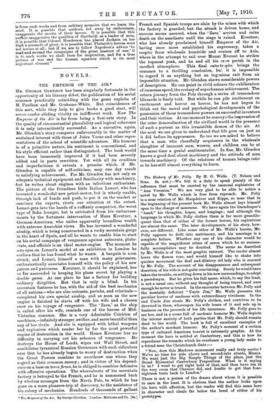NOVELS.
THE EMPEROR OF THE AIR.*
MR. GEORGE GLENDON has been singularly fortunate in the opportunity of his literary debut, the publication of his aerial
romance practically coinciding with the great exploits of M. Paulhan and Mr. Grahame-White. But coincidences of this sort, while they help to give books a good start, will
never confer abiding vitality on indifferent work. Now The Emperor of the Air is far from being a first-rate story. In the quality of circumstantial plausibility and logical coherence
it is only intermittently successful. As a narrative, again, Mr. Glendon's story compares unfavourably in the matter of sustained interest with those of Jules Verne and other repre-
sentatives of the school of scientific adventure. His humour is of a primitive nature, his sentiment is conventional, and his style efficient rather than distinguished. The book would have been immensely improved if it had been severely edited and in parts rewritten. Yet with all its crudities and imperfections it reveals a promise which, if Mr. Glendon is capable of self-criticism, may one day result in satisfying achievement. For Mr. Glendon has not only an adequate technical equipment and familiarity with machinery, Ibut he writes about engines with an infections enthusiasm. The picture of the friendless little Italian Lonari, who has invented a wonderful new petrol-Motor, but is utterly unable, through lack of funds and push, to put it on the market or .convince the experts, rivets our attention at the outset. Lonari gets into the hands of a ruffianly compatriot, the worst type of Soho lounger, but is extricated from his embarrass- ments by the fortunate intervention of Hans Kreutzer, a German-American, who unites apparently boundless wealth with extreme Anarchist views. He has invented a wonderful -airship, which is being constructed in a rocky mountain gorge in the heart of Spain, and all he wants to enable him to start on his aerial campaign of vengeance against autocrats, pluto- crats, and officials is an ideal motor-engine. The moment he sets eyes on Lonari's model at an exhibition in London he realises that he has found what he wants. A bargain is saon struck, and Lonari, himself a man with many grievances, enthusiastically associates himself with the policy of his new patron and patroness. Kreutzer, it should be explained, has so far succeeded in keeping his plans secret by playing a .double game. At one place he has a factory for building .ordinary dirigibles. But that is only a blind. In his mountain fastness he has, with the aid of the best mechanics =of all nations—who are also outcasts, pariahs, and criminals— .completed his own special airship, and as soon as the new engine is finished he starts off with his wife and a chosen crew on his voyage of vengeance. The Zara,' as the ship is called after his wife, reminds one of the heroes of Mid- Victorian romance. She is a very Admirable Crichton of machines,—infinitely stronger, swifter, and more beautiful than any of her rivals. And she is equipped with lethal weapons and explosives which render her by far the most powerful engine of destruction in the world. Hence Kreutzer has no difficulty in carrying out his schemes of vengeance. He destroys the House of Lords, wipes out Wall Street, and annihilates tyrannical Russian Governors with such ridiculous ease that he has already begun to weary of destruction when the Great Powers combine to overthrow one whom they regard as their common enemy ; and in virtue of his depend- enee on a base on terra firma, he is obliged to combine defensive with offensive operations. The whereabouts of his mountain factory is betrayed to the French, and he is summoned back by wireless messages from the North Pole, to which he has gone on a mere pleasure-trip of discovery, to the assistance of his colony of mechanics. Hundreds of thousands of gallant • Th. Bniporor of the Air. By George Glendon. London : Methuen and Co. [68.3 prototypes. French and Spanish troops are slain by the mines with which the factory is guarded, but the attack is driven home, and success seems assured, when the Zara' arrives and rains death on the assailants until the siege is raised. Kreutzer, who has already proclaimed himself Emperor of the Air, having once more established his supremacy, takes a respite from wholesale homicide and cruises off to Asia, where in the attempt to sail over Mount Everest he strikes the topmost peak, and he and all his craw perish in the rarefied atmosphere. This final catartraphe brings the romance to a thrilling conclusion, bu':, it is impossible to regard it as anything but an ingenious exit from an impossible situation. Mr. Glendon shows considerable powers of description. He can paint in vivid colours the exhilaration of immense speed, the ecstasy of superhuman achievement. The return journey from the Pole through a series of tremendous blizzards is finely told. But while be can pile excitement on excitement and horror on horror, he has not begun to think out the moral and psychological developments of the possession of these tremendous powers on successful inventors and their victims. At one moment be conveys the impression of the utter demoralisation of the civilised world in the presence of such a portent as this irresistible demon of the air. At the next we are given to understand that life goes on just as it did before its appearance. So too we are asked to believe that a man who cheerfully acquiesces in the wholesale slaughter of innocent men, women, and children can be at the same time a genial sentimentalist. In fine, Mr. Glendon knows a good deal about machinery and the attitude of men towards machinery. Of the relations of human beings inter se he has still almost everything to learn.










































 Previous page
Previous page